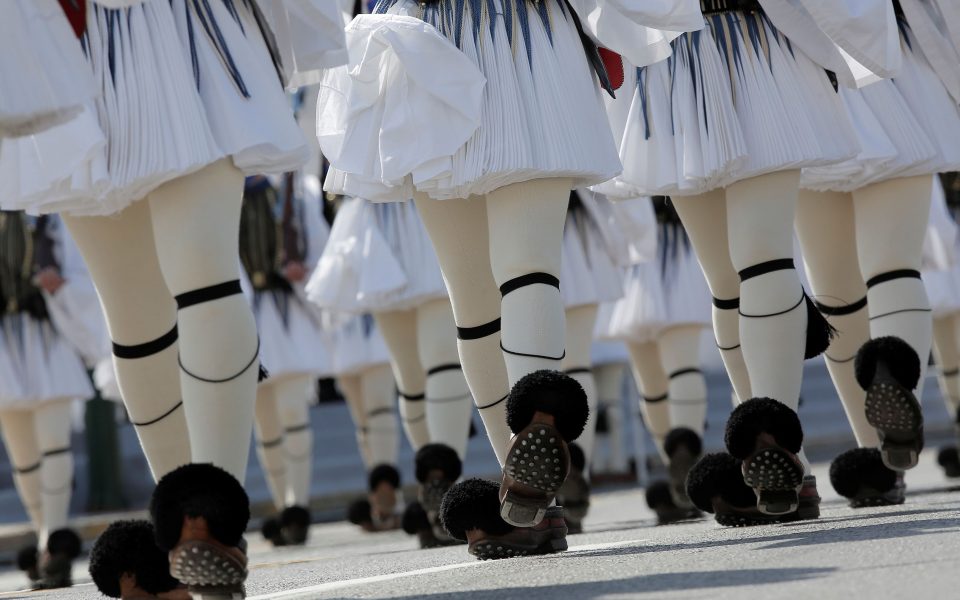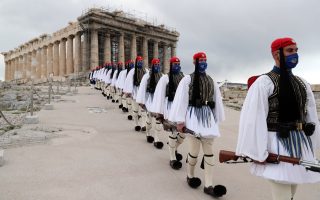Freedom’s light

“Our race was crucified many times, but, here we are, still alive.” (General Theodoros Kolokotronis, hero of the Greek War of Independence)
As we celebrate in 2021 the 200th anniversary of the uprising that led to Greek independence from more than 400 years of Ottoman rule, democracy, worldwide, remains under assault. Authoritarianism is rooted in and on the rise in more than 50 nations from Istanbul, to Moscow, to Kinshasa, to Damascus, to Baku, to Tehran, to Naypyidaw, to Beijing, to Hong Kong, to Pyongyang, to Havana, to Caracas, and recently, Washington, DC, where ex-president Donald J. Trump incited an insurrection on January 6, 2021 to prevent the peaceful transition of power in the United States. The ex-president’s continuing efforts to rally his loyalists in the “big lie” and “stop the steal” campaign by spreading falsehoods about the 2020 US elections has emboldened dictators and presents a new dimension to the enduring and growing threats to democracy around the world. Former US President Ronald Reagan’s warning that “freedom is never more than one generation away from extinction. We didn’t pass it to our children in the bloodstream. It must be fought for, protected, and handed on for them to do the same…” reinforces the importance of Greek Independence Day for all who cherish democracy and freedom to remember. On four occasions in less than 150 of the 200 years since 1821, freedom’s light in Greece came dangerously close to being extinguished by some of the darkest and most powerful forces of tyranny: in the 1820s by the Ottoman Turks, in the 1940s by the Axis powers, in the late 1940s by communist insurgents who aspired to put Greece behind the “Iron Curtain,” and from 1967 to 1974 by the right-wing military junta or “Regime of Colonels.” In each struggle, the Greeks fought against much more difficult odds than we face today.
When Greece, the underdog, struck an unlikely blow for freedom against the seemingly invincible Ottoman Empire, democracy was reborn in its birthplace. Ottoman Turkish-occupied Greece missed out on the European Enlightenment and the revolutions, such as the American Revolution, which were inspired by ancient Greek ideals of freedom and democracy. But, the Greeks, who endured more than 400 years of Ottoman Turkish occupation and attempts to erase their history, language, traditions and culture, showed the world freedom’s light can never be fully extinguished.
Founding father and former US President Thomas Jefferson, inspired by the teachings of the ancient Greeks, noted: “To the ancient Greeks… we are all indebted for the light which led ourselves [American colonists] out of gothic darkness.” As freedom’s light burned brighter in the United States following America’s successful War of Independence from the world’s greatest superpower at the time, Great Britain, America’s success became a source of inspiration to the modern Greeks, as noted in 1821 by Greek War of Independence Commander in Chief Petros Mavromichalis when he said to the citizens of the United States, ‘‘It is in your land that liberty has fixed her abode and… in imitating you, we shall imitate our ancestors and be thought worthy of them if we succeed in resembling you.’’
In October of 1940, 119 years after the beginning of their struggle against the Ottoman Turks, darkness descended upon Greece, once again. The Axis forces of Hitler’s Nazi Germany and its allies had defeated 15 countries in Europe, including France, the greatest European military power at the time, with little or no resistance. The Greeks stood alone as they defiantly said “Oxi” (“No”) to submitting to Axis-Fascist Mussolini’s Italian Army invasion. The Greeks’ defeat of Mussolini’s army, the first Allied victory against seemingly invincible Axis forces that had nearly defeated all of Europe, marked a turning point in the war. Although Greece eventually fell to Nazi German occupation by June of 1941 after the fall of Crete, the valiant and continuing resistance of the Greeks continued to inspire resistance fighters and Allied forces throughout Europe. Moved by the Greek resistance to tyranny, US President Franklin Roosevelt said, “When the entire world had lost all hope, the Greek people dared to question the invincibility of the German monster raising against it the proud spirit of freedom.” Winston Churchill noted, “Hence, we will not say that Greeks fight like heroes, but that heroes fight like Greeks.”
With the defeat of Nazi tyranny in WWII, however, some of Greece’s darkest days would come as war-torn Greece became ground zero in the first proxy war of the Cold War. The highly polarized struggle between the ideologies of the left and right and attempts to fill the power vacuum left by the retreat of the Axis powers escalated to armed violence. Armed rebellion ensued between Greeks as leftists refused to disarm and called for resistance. The Greek Civil War against communist tyranny from 1944 to 1949 fought by Greeks supported by Great Britain and then, the United States, against Greeks supported by the newly formed Socialist countries of Yugoslavia, Bulgaria and Albania, backed by the Soviet Union, pitted Greeks against Greeks as communists attempted to bring Greece behind the Iron Curtain. A combination of US Truman Doctrine aid, Marshall Plan aid and US military adviser support led by US Army General James Van Fleet resulted in the most successful counter-insurgency effort of the 20th century. Freedom-loving Greeks defeated the Greek communist guerrillas and proved, once again, against all odds they had the “will to win,” as the general would say, to keep freedom’s light burning.
Although the communists in Greece were defeated militarily in 1949, the ensuing decades of national division between the left and right culminated in the coup d’état of April 21, 1967. With complicity and support from the United States and the Holy See in the Vatican due to the height of the Cold War threat of communism, the coup was organized to pre-empt the possibility of a left-wing government achieving victory in the scheduled May 28, 1967 elections. The junta in the birthplace of democracy was an embarrassment to the free world and resulted in disastrous events such as the Polytechnic tragedy, the Turkish invasion of Cyprus, the birth of the November 17 terrorist organization, Greece’s temporary withdrawal from NATO’s military command, and the delayed integration of Greece into the European Union. It would not be until November 1999 when former US President Bill Clinton during his visit to Athens stated, “When the junta took over in 1967 here, the United States allowed its interests in prosecuting the Cold War to prevail over its interests – I should say its obligation – to support democracy, which was, after all, the cause for which we fought the Cold War.” He added: “It is important that we acknowledge that. The impact, I hope, is that people in our country too will realize that it’s good to look back on our own history and recognize our errors…”
The fight for democracy and freedom requires the vigilance of citizens and leaders to engage beyond the act of voting. May all who struggle to keep freedom’s light burning continue to draw inspiration from the courage of the Greeks and remain steadfast in the daily fight to preserve and protect democracy and freedom for generations to come. Ζήτω Ελλάς!
Commander Demetries Grimes, a former US naval officer and aviator, has served as naval attaché to Greece and Israel, deputy commander of the US base on Crete, and adviser to NATO’s maritime commander in London.





